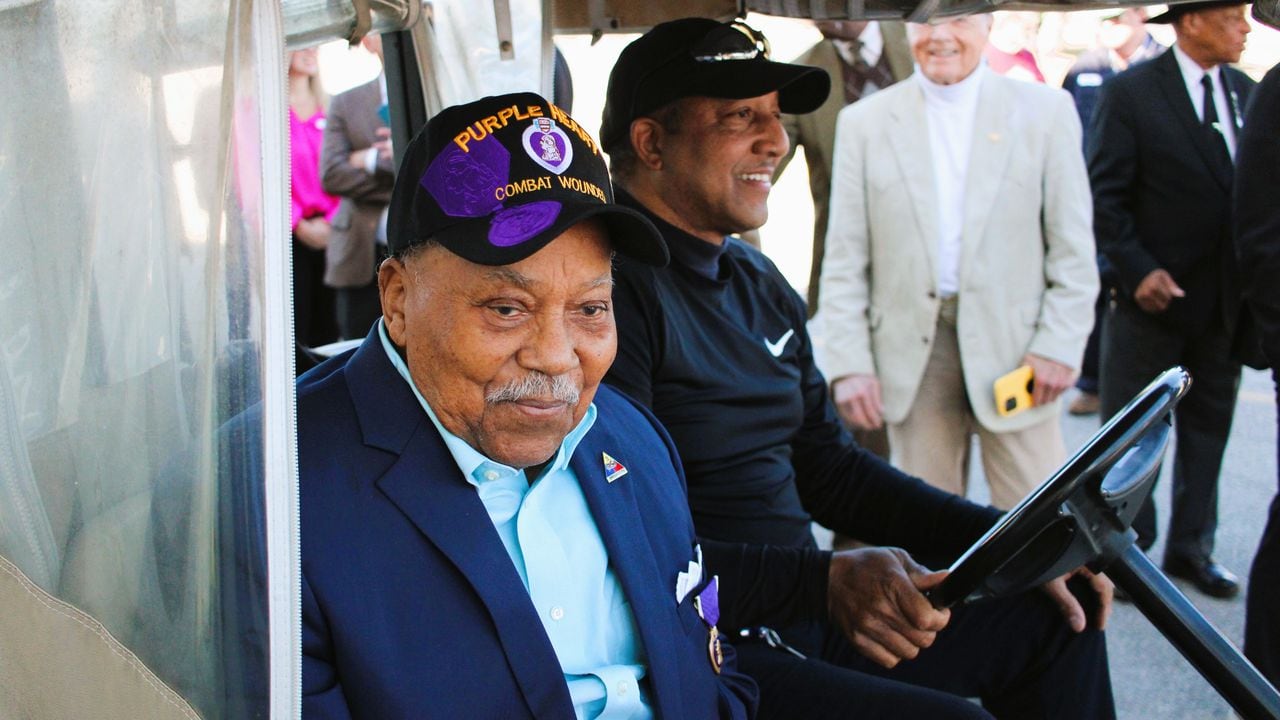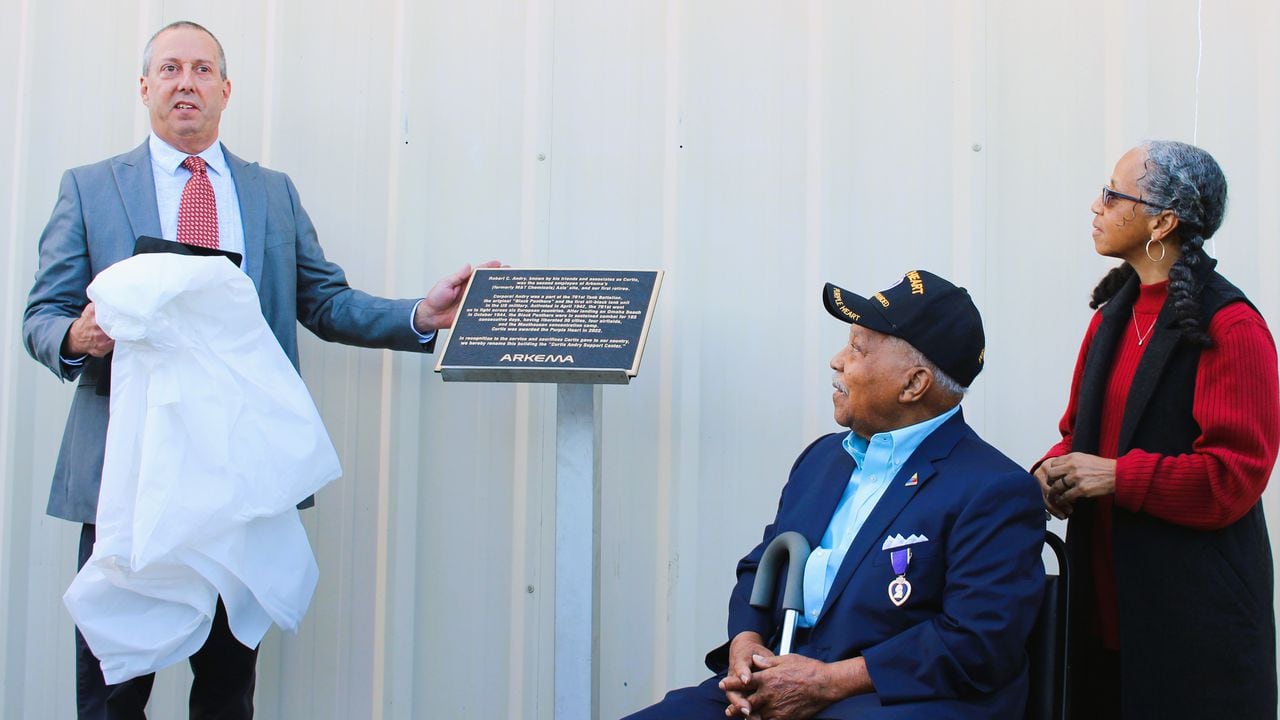World War II vet honored at Alabama chemical plant where he once worked
The wounds that Robert “Curtis” Andry received on a World War II battlefield have made themselves felt every day of his life since. But he’s received his share of blessings too, and on Tuesday he received another: The 98-year-old veteran was surrounded by relatives and well-wishers as Arkema named a warehouse where he once worked in his honor.
Andry grew up in the Chastang community north of Mobile. Drafted into the U.S. Army during WWII, he was assigned to the 761st Tank Battalion, an all-Black unit serving under Gen. George Patton. The 761st, known as the Black Panthers, became a legendary unit: The National WWII Museum says it entered battle in November 1944 and was in “heavy combat right through to the end of the war.”
Andry’s part in it came to an early and nearly fatal end that November. He was operating the main gun on a Sherman tank when an enemy shell hit the turret, leaving him with extensive burns and other wounds. In a 2012 interview for the Mobile Press-Register, he described the battlefield treatment he received: He was given morphine and bandaged, then buried up to his neck in a shallow trench so that he was immobilized, hidden and somewhat protected from the elements. There he stayed until medics came along to dig him up and get him to a field hospital. Eventually he received treatment in England.
Curtis Andry, accompanied by his daughter Terry Dees, looks on as Plant Manager Rene Neron unveils a plaque honoring Andry’s WWII service. A building at Arkema’s plant in Axis, Ala., was renamed in Andry’s honor on Jan. 30, 2024.Lawrence Specker | [email protected]
After the war, Andry came home to the Chastang area, married, and raised a large family. He worked in a hardware store in Mount Vernon for many years. He said Tuesday that job ended when the store was bought out, and that’s when he found work at a growing chemical plant in Axis. Arkema, formerly M&T Chemicals, says he was the second person hired at the company’s Axis site, and, 10 years later, the first to retire.
On Tuesday, plant manager Rene Neron led a ceremony in which a warehouse on the site off U.S. 43 was officially named the R. Curtis Andry Support Center.
It’s hardly the first honor for Andry, who said he’ll turn 99 in about two months. In 2012, then-Mobile Mayor Sam Jones proclaimed that July 3 to be Robert Curtis Andry Jones Day in Mobile. In March 2022, U.S. Rep. Jerry Carl presented him with the Purple Heart he’d earned so long ago. He was featured in a 2023 documentary on the 761st in which he’s visited at home by host Morgan Freeman. The interview can be seen at www.history.com.
“This man is a true hero,” Neron said during Tuesday’s ceremony. He said the company was proud to recognize Andry “for his sacrifice and dedication to his country, and to our local community here.”
Neron said Mobile Mayor Sandy Stimpson had issued a proclamation recognizing the significance of the occasion. The event was presented in conjunction with the Mobile Chamber, whose president and CEO, Bradley Byrne, noted that Andry and his fellow Black service members had to face “dual battles on the front lines – one against enemy forces in Europe and another against the deeply entrenched racism and segregation in the ranks of their own country.”

WWII veteran Curtis Andry, 98, enjoys a golf cart ride to a reception after a Jan. 30, 2024, ceremony at the Arkema chemical plant in Axis, Ala., where a building was named in his honor.Lawrence Specker | [email protected]
“Let us acknowledge the debt of gratitude we owe to these trailblazers,” Byrne said. “Their efforts not only helped secure victory in one of the darkest chapters of human history, but also paved the way for the desegregation of the United States military.”
Andry himself was a man of few words during the ceremony, though he seemed to be enjoying himself a great deal. “I’m sorry to say, that I’m happy to say, that I have nothing to say,” he joked.
Andry’s Catholic faith has been a major factor in his life – he has said he was praying a rosary as he went into that fateful battle – and the ceremony featured blessings and prayers led by The Rev. Victor Ingalls on behalf of St. Peter the Apostle Catholic Church in Chastang.
“It helped, the Lord and the Blessed Virgin Mary, that’s why I’m here today,” Andry said afterward. “If they had not been with me, I wouldn’t have been here.”
“I was born and reared right up in Chastang, Alabama,” he said. “I was born in the St. Peter’s Church right there. I graduated from high school there. Two-three days, I got my invitation. After that I went straight from there, to the training, to Europe.”
Moving his right arm, Andry said it was a daily reminder. “I haven’t been able to use this arm to reach my mouth since November the ninth, 1944,” he said.
He said this latest recognition meant a lot to him. “It’s been an honor to me to be here and to be able to work here,” he said.
